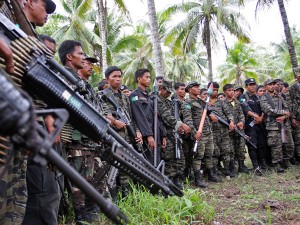
Moro rebels are seen inside their camp in remote village of Mamasapano town in Maguindanao. INQUIRER FILE PHOTO
Indonesian peace monitors on Sunday joined an international mission in Mindanao tasked to ensure that a ceasefire between the Philippine military and the Moro Islamic Liberation Front (MILF) held as both sides aimed to sign a peace agreement this year.
Presidential Peace Adviser Teresita Deles said government negotiators and the 12,000-strong MILF were taking steps to resolve key differences, including the extent of power to be given to a Muslim autonomous region in Mindanao.
Deles spoke on the sidelines of a welcoming ceremony for 15 Indonesian soldiers and civilian conflict-resolution experts who arrived in Manila to join an international contingent safeguarding a ceasefire between government troops and the rebels.
The Associated Press reported MILF negotiator Mohagher Iqbal as saying he shared the government’s optimism about a peace deal being signed this year.
Iqbal said the Indonesian truce monitors could help create an atmosphere conducive to peace talks.
The Indonesian monitoring team consisted of 10 military officials and five civilian experts on conflict prevention.
Indonesia deployed the team upon the request of the Philippine government and the MILF, according to Indonesian Ambassador to the Philippines Yohannes Kristiarto Soeryo Legowo.
The Indonesian group is the newest foreign contingent to join the mission, which consists of about 40 others from Malaysia, Brunei, Japan, Libya and the European Union.
“Their arrival is an assurance that the ceasefire is seriously in place,” Deles told reporters.
‘Cautiously optimistic’
Deles said the government and the MILF were aiming to sign a peace deal by the end of the year, following a breakthrough agreement in April in which both sides committed to create a new autonomous political region in Mindanao.
“We are expanding common grounds and we are both looking for ways on how to close distances on the most contentious issues,” she said.
Deles said “there are certainly signs that the two sides are moving toward addressing each other’s concerns.”
Asked whether a final peace deal would be signed this year, Deles said the two sides were “cautiously optimistic.”
Moro autonomy
The MILF has waged a rebellion for more than three decades, originally for the establishment of an independent state in Mindanao.
The rebel group, however, has dropped its bid for full independence in favor of autonomous control over large areas in Mindanao, which it claims as Bangsamoro ancestral domain.
The insurgency has claimed more than 150,000 lives since the Moro rebellion began in the early 1970s.
The peace effort nearly collapsed in October last year after MILF rebels killed 19 soldiers who they claimed entered their area in violation of the truce.
The killings touched off fierce battles on several fronts in Mindanao, during which as many as 40 soldiers, police and civilians were killed and thousands displaced.
Ceasefire holding
Both sides later agreed to forge ahead, and there had not been any fighting since January.
“We are in a very crucial stage of the negotiations, and it is very important at this time [that] the ceasefire [holds],” Deles said.
Legowo is traveling to Mindanao today to hand over the Indonesian peace monitors to the international mission there.
The Indonesian team will undergo a weeklong debriefing in Cotabato City before being deployed to several places in Mindanao, according to a statement from the Indonesian Embassy.
OIC review
Indonesia, Legowo said, has been involved in the Philippine peace process since 2007 through the Organization of Islamic Cooperation (formerly Organization of the Islamic Conference), which reviews the implementation of the Philippine government’s 1996 peace agreement with the smaller Moro National Liberation Front (MNLF).
The Philippines has also been involved in the search for peace in Indonesia.
Legowo said the Philippines deployed a monitoring team to Indonesia when the Indonesian government was dealing with separatist rebels in Aceh, in northern Sumatra, in the 1990s. Reports from AP, AFP and Jerry Esplanada
Originally posted: 2:14 pm | Sunday, July 1st, 2012